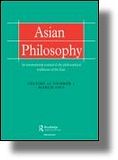Asian Philosophy 2011 - Vol. 21,1
Verfasst von pw am Sa, 03/19/2011 - 22:05.
Asian Philosophy
Asian Philosophy : an international journal of Indian, Chinese, Japanese, Buddhist, Persian and Islamic philosophical traditions / ed. by Brian Carr ... - Vol. 21 (2011). - London [u.a.] : Routledge, 2011.
ISSN 0955-2367 (Print-Ausg.)
ISSN 1469-2961 (Online-Ausg.)
URL: Taylor & Francis
DDC: 181
Aus dem Inhalt: Vol. 21,1 (Febr. 2011)
Dasti, Matthew:
Indian Rational Theology: Proof, Justification, and Epistemic Liberality in Nyaya's Argument for God. - In: Asian Philosophy. - 21 (2011), S. 1-21.
DOI: 10.1080/09552367.2011.536631
DOI: 10.1080/09552367.2011.536631
Abstract: In classical India, debates over rational theology naturally become the occasion for fundamental questions about the scope and power of inference itself. This is well evinced in the classical proofs for God by the Hindu Nyaya tradition and the opposing arguments of classical Buddhists and Mīmasa philosophers. This paper calls attention to, and provides analysis of, a number of key nodes in these debates, particularly questions of inferential boundaries and whether inductive reasoning has the power to support inferences to wholly unique entities (like God). Further questions probed involve the supposed connection between structured objects and agential creators, and the status of examples used in traditional inference. Further, it calls attention to and defends what may be called an epistemological liberalism, championed—paradoxically perhaps—by Nyaya, and opposed by Buddhists and Mīmasakas.
Slakter, David:
On Mātsyanyāya: The State of Nature in Indian Thought. - In: Asian Philosophy. - 21 (2011), S. 23-34.
DOI: 10.1080/09552367.2011.536652
DOI: 10.1080/09552367.2011.536652
Abstract: This paper calls attention to matsyanyaya, or state of nature theories, in classical Indian thought, and their significance. The focus is on those discussions of matsyanyaya found in the law books, political treatises and the Mahabharata epic. The significance and relevance of matsyanyaya theories are shown through a comparison with early modern state of nature theories and an elaboration on the possible place of rights and dharma in matsyanyaya and the consequences of this for classical Indian political theory.
Schroeder, John:
Truth, Deception, and Skillful Means in the Lotus Sūtra. - In: Asian Philosophy. - 21 (2011), S. 35-52.
DOI: 10.1080/09552367.2011.537442
DOI: 10.1080/09552367.2011.537442
Abstract: This article seeks to broaden contemporary scholarship on the Lotus Sutra by arguing that it is a philosophically critical, self-reflective text struggling with problems of truth in Buddhist discourse. While all Lotus Sutra scholars agree that the doctrine of skillful means is a central teaching in the text, there is a common tendency to frame skillful means as a passive vehicle (or 'means') for expressing truth rather than an active philosophical critique of truth. This article argues that the Lotus Sutra uses skillful means as a distinct form of criticism within a larger debate over the nature and efficacy of Buddhist practice, and that it raises important issues about truth that are shared by other important Buddhist thinkers and texts such as Nagarjuna, Lin-chi and the Vimalakīrtinirdeśa. It analyzes key passages and parables without reducing the ethical teachings of the Lotus Sutra to simplistic versions of utilitarianism, paternalism, or relativism, and without dissolving the critical elements that make the Lotus Sutra a genuinely philosophically interesting text.
Hongladarom, Soraj:
The Overman and the Arahant: Models of Human Perfection in Nietzsche and Buddhism. - In: Asian Philosophy. - 21 (2011), S. 53-69.
DOI: 10.1080/09552367.2011.537478
DOI: 10.1080/09552367.2011.537478
Abstract: Two models of human perfection proposed by Nietzsche and the Buddha are investigated. Both the overman and the arahant need practice and individual effort as key to their realization, and they share roughly the same conception of the self as a construction. However, there are also a number of salient differences. Though realizing it to be constructed, the overman does proclaim himself through his assertion of the will to power. The realization of the true nature of the self does not lead the overman to seek the way to be released from sasara as does the arahant. On the contrary, he rejoices in the eternally recurring situation. The arahant, however, has totally relinquished any attachment to the self, constructed or otherwise. The arahant does not care about the Eternal Recurrence, as he only focuses on the present moment. Finally, they are both beyond good and evil, but in a substantively different way.
Ähnlich
- Sambhasa 2013 - 30
- Journal of Indian Philosophy 2011 - 39,6
- Sambhasa 2011 - 29
- Studies in Indian philosophy and Buddhism 2011 - 18
- Journal of Indian Philosophy 2011 - 39,4-5
- Journal of Indian Philosophy 2011 - 39,3
- Journal of Indian Philosophy 2011 - 39,2
- Journal of Indian Philosophy 2011 - 39,1
- Journal of Indian Philosophy 2010 - 38,2-4
- Journal of Indian Philosophy 2010 - 38,1

